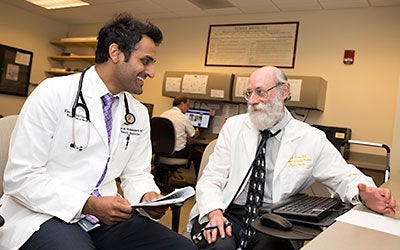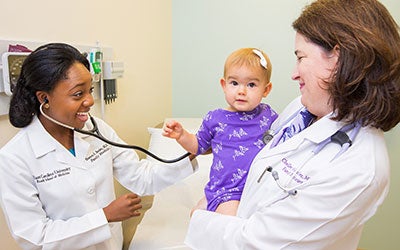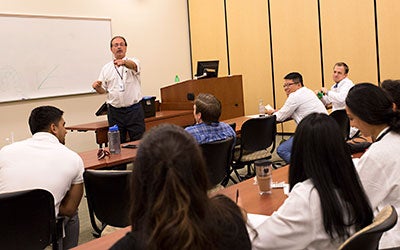Standard Family Medicine Residency Program – Curriculum
The Intern Year
 There are (13) blocks to each PGY level of training, with each block comprised of a (4) week period of time. During the intern year, rotations include two months of exclusive outpatient experiences in the Family Medicine Center, including continuity clinic, procedural skills, didactic sessions, and hands-on workshops. The first PGY-1 rotation provides an extended orientation experience for new residents to become comfortable practicing in our center.
There are (13) blocks to each PGY level of training, with each block comprised of a (4) week period of time. During the intern year, rotations include two months of exclusive outpatient experiences in the Family Medicine Center, including continuity clinic, procedural skills, didactic sessions, and hands-on workshops. The first PGY-1 rotation provides an extended orientation experience for new residents to become comfortable practicing in our center.
Three blocks of the PGY-1 year are spent on the Family Medicine Inpatient Service, where residents learn from our own faculty. Care is provided to a broad range of adult patients in settings ranging from the Observation Unit to the Medical Intermediate Unit, where high-acuity patients are managed with intravenous drips, non-invasive ventilation support, and highly-focused nursing care.
Surgical and obstetric rotations are based in our Level 1 Trauma Center, where residents are given significant independence while working one-on-one with attending physicians. The remainder of the PGY-1 year includes experiences in cardiology, intensive care, emergency medicine, newborn care, inpatient pediatrics, and geriatrics. Throughout the year, on-call duties do not exceed one in four nights.
Second & Third Years
 After the first year, most training takes place in an ambulatory setting. Second- and third-year residents work one-on-one with various specialists in outpatient clinics for orthopedics, sports medicine, ENT, urology, and ophthalmology. Elective time allows residents to pursue areas of personal interest, whether in Greenville or elsewhere.
After the first year, most training takes place in an ambulatory setting. Second- and third-year residents work one-on-one with various specialists in outpatient clinics for orthopedics, sports medicine, ENT, urology, and ophthalmology. Elective time allows residents to pursue areas of personal interest, whether in Greenville or elsewhere.
PGY-2 residents on the Family Medicine Inpatient Service provide primary management of the care teams, and PGY-3 residents staff the night float system.
PGY-2 and -3 residents on non-inpatient rotations also cover the Family Medicine Obstetrics Service two to three times per month.
Residents have ample opportunity to work with and teach medical students in a variety of inpatient and outpatient settings. They play a vital role in the clinical skills training of medical students during the first and second years, as well as during third- and fourth-year clerkships.
Rural Family Medicine Residency Program – Curriculum
The Intern Year
There are (13) blocks to each PGY level of training, with each block comprised of a (4) week period of time. For our rural residents, the majority of their time during the intern year will be spent at ECU Health Medical Center in Greenville, NC. ECU Health Medical Center is a large, tertiary academic medical center and the only Level 1 trauma center serving the 29-county catchment region of eastern North Carolina and the 1.5 million people that call this region home. There is an enormous amount of advanced and rare pathology that residents will be exposed to in this tertiary medical environment. There is also an abundance of family medicine resources, coupled with non-family medicine specialists and sub-specialists working in this tertiary medical center that rural residents can draw upon to augment their medical education and training. The goal of the intern year in our rural program is to expose rural residents to a plethora of pathology and acuity in a resource-abundant environment.
During the intern year, rotations include two blocks of exclusive outpatient experiences at the rural continuity clinic to which the resident matches (Roanoke Chowan Community Health Center in Ahoskie, Goshen Medical Center in Beulaville, or Rural Health Group-Halifax Medical Specialists in Roanoke Rapids). The first PGY-1 block provides an extended orientation experience for new residents to become comfortable practicing in their assigned continuity clinic and ECU Health Medical Center. Weekly didactic sessions are also held every Thursday afternoon in the outpatient clinics. Hands-on workshops and simulation labs are performed on an intermittent basis throughout the year.
Additionally, rural residents will spend a designated block at the ECU Family Medicine Center in Greenville in the Skills/Procedures clinic, where they will be exposed to and have the opportunity to become proficient in outpatient procedures such as cryotherapy, surgical nail avulsion, wound debridement, lipoma excision, skin biopsies, circumcision, vasectomy, nexplanon placement and removal, IUD placement and removal, colposcopy, LEEP, endometrial biopsy, OB ultrasound, and exercise stress testing.
Four blocks of PGY-1 are spent on the Family Medicine Inpatient Service (FMIS) at ECU Health Medical Center, where residents learn from our own academic faculty. While on the FMIS, residents will provide care to a broad range of adult patients in settings ranging from the Observation Unit to the Medical Intermediate Unit, where high-acuity patients are managed with intravenous drips, non-invasive ventilation support, and highly-focused nursing care. During the fourth FMIS block which occurs towards the end of the intern year, rural residents will work alongside a senior standard program resident in an “acting senior” role, with the goal of the rural resident becoming comfortable and proficient at leading an interdisciplinary medical team, delegating appropriate responsibilities to care team members, and providing oversight and constructive feedback to care team members. This adult medicine exposure and training is complemented by additional rotations on the pediatric inpatient service and newborn nursery – each comprised of one block, where residents will care for pediatric patients from newborns up to the age of 18.
Surgical and obstetric blocks are also based in our Level 1 Trauma Center at ECU Health Medical Center. Residents are given significant independence while working with attending physicians.
Rural residents will also spend one block on the Medical Intensive Care Unit, where they will work with Intensivist or Pulmonary/Critical Care faculty to care for the most critically ill patients in our region.
The remainder of PGY-1 includes a half-block rotation in the Pediatric Emergency department and a half-block rotation in the Adult Emergency department at our Level 1 Trauma Center at ECU Health Medical Center.
Second and Third Years
After the first year, most training takes place in the rural ambulatory setting to which the rural resident matched. The goal of the PGY-2 and -3 years in our rural program is to expose rural residents to the unique opportunities of practicing medicine in rural and unopposed training environments while simultaneously training the resident to be proficient, resilient, and creative with resource access challenges that are present in many rural environments.
Each year during PGY-2 and -3, the rural resident will complete two blocks of exclusive outpatient experiences at the rural continuity clinic to which the resident matches (Roanoke Chowan Community Health Center in Ahoskie, Goshen Medical Center in Beulaville, or Rural Health Group-Halifax Medical Specialists in Roanoke Rapids). Each year, rural residents will also spend one block in a rural outpatient pediatrics clinic and one block in OB/GYN clinic with inpatient labor and delivery responsibilities in their local community hospital.
During PGY-2, the rural resident will also complete four blocks of rural community hospital rotations at the rural community hospital to which the resident matches (ECU Health Roanoke Chowan Hospital in Ahoskie, ECU Health Duplin Hospital in Kenansville, or ECU Health North Hospital in Roanoke Rapids). The first block of PGY-2 will be a rural community hospital Emergency Department rotation so that the rural resident can become more familiar with the local rural hospital, specialists and sub-specialists that staff this hospital, and the local patient population that this hospital serves. Additionally, the rural resident will complete a block of rural community obstetrics under the supervision of local obstetricians and with the guidance and input from local family physicians on continuity patients. This block may be completed at once or longitudinally over the course of the year in conjunction with other rotations, depending on obstetrical patient volume, to ensure a robust rural obstetrical experience during the residency training. The final two rural community hospital blocks will be community hospital inpatient blocks where residents will work with local rural hospitalists and family physicians that practice inpatient medicine to care for the local rural populace.
PGY-2 and PGY-3 rural residents will also work one-on-one with various specialists in one-block rotations based in outpatient clinics, such as: migrant farm worker clinics/agricultural medicine, ENT, ophthalmology, neurology, endocrinology, cardiology, dermatology, nephrology, gynecology, urology, orthopedics, sports medicine, rheumatology, nutrition, hematology/oncology, radiology, radiation oncology, geriatrics, and palliative care. Many of the rural outpatient clinics also have rural community hospital inpatient consult components.
Elective time during PGY-2 and -3 allows rural residents to pursue areas of personal interests, whether in their assigned rural community, Greenville, or elsewhere.
Our rural program is also supportive of global health training and supports multiple medical mission initiatives in which our residents can complete electives on medical rotations abroad, including the Dominican Republic, Zambia, and The Philippines.
During PGY-3, the rural resident will also complete one block of Psychiatry, which includes ED consults, Inpatient Psychiatry, Outpatient Psychiatry, Substance abuse management, and ECT therapy exposure at the large tertiary medical center. Additionally, PGY-3 residents will complete a block rotation in wound management and hyperbaric medicine. PGY-3 rural residents will also complete a Health Systems Management block which will serve as a capstone rotation to provide a deeper understanding of the complexities and nuances of healthcare system operations. This rotation will include time devoted to working alongside administrators and chief medical officers in academic outpatient centers, FQHCs, private community practices, rural community hospitals, urban tertiary hospitals, and large-scale regional healthcare systems, as well as with healthcare advocacy organizations at the local and state level and designated didactic time devoted to healthcare systems management, healthcare leadership, and practice management.
Conferences
 Our Thursday noon conferences include presentations on core topics related to inpatient care and the department’s Grand Rounds lectures. The remainder of each Thursday afternoon is set aside for didactics for all residents. This didactic time is protected time, meaning residents are relieved of other patient care duties and responsibilities to allow for their participation. Attendance and participation is expected and mandatory, and didactics are provided virtually for residents who are off-site to reduce travel burden.
Our Thursday noon conferences include presentations on core topics related to inpatient care and the department’s Grand Rounds lectures. The remainder of each Thursday afternoon is set aside for didactics for all residents. This didactic time is protected time, meaning residents are relieved of other patient care duties and responsibilities to allow for their participation. Attendance and participation is expected and mandatory, and didactics are provided virtually for residents who are off-site to reduce travel burden.
Family Medicine faculty as well as other subspecialty faculty provide a mixture of traditional lectures and hands-on workshops. Residents also have the opportunity to present evidence-based medicine lectures that answer common clinical questions.
Procedural Skills Training
Procedural skills are an important component of a family physician’s practice, and our program makes sure you are well trained to provide core procedures. Residents have ample opportunity to observe, assist, and perform a variety of procedures:
- Skin procedures, such as biopsies, excisions, and cryotherapy
- Gynecological procedures, including colposcopy, endometrial biopsy, Nexplanon and IUD placement
- Newborn circumcision
- No-scalpel vasectomy
- Exercise stress testing
Fellowships
Residents benefit from the expert teaching provided by fellowship-trained faculty in geriatrics FMOB, hospice/palliative medicine, and sports medicine. For more information on fellowship program offered by our department, check out the links provided below: